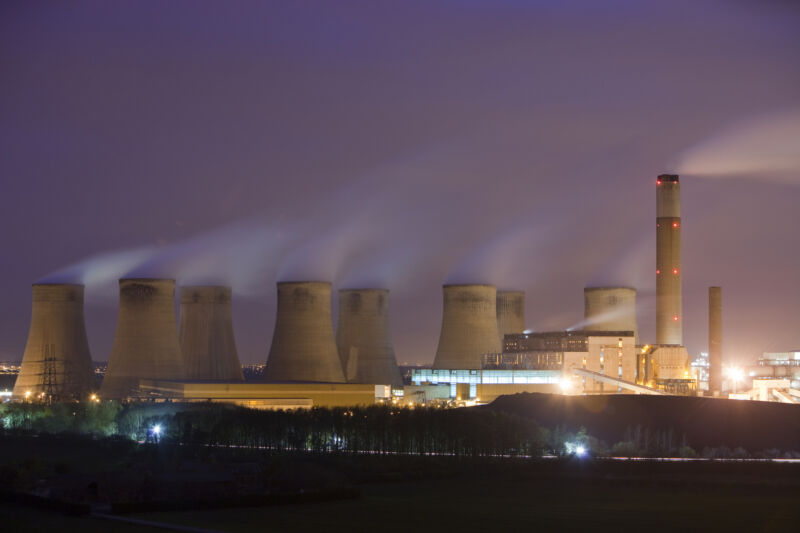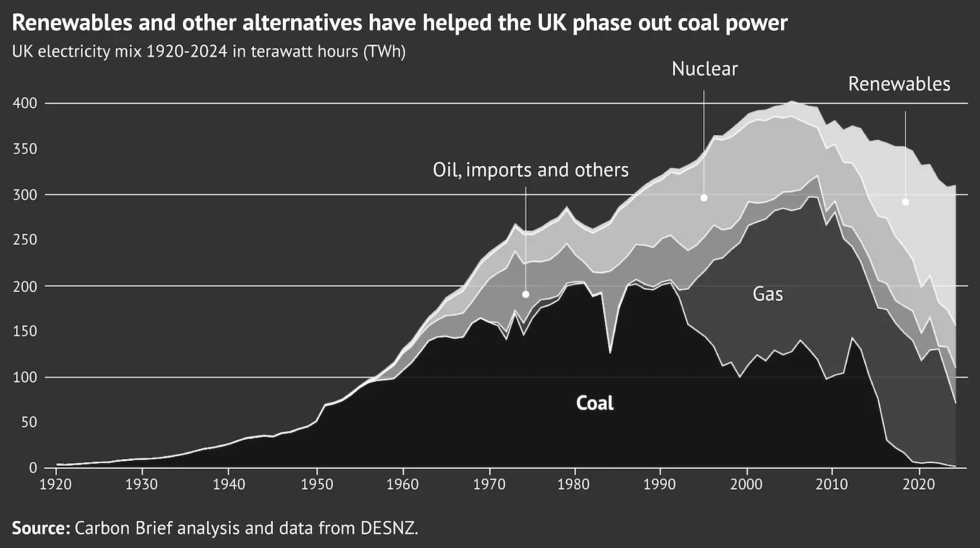
This article was originally published on ARS Techica - Science. You can read the original article HERE

On Monday, the UK will see the closure of its last operational coal power plant, Ratcliffe-on-Soar, which has been operating since 1968. The closure of the plant, which had a capacity of 2,000 megawatts, will bring an end to the history of the country's coal use, which started with the opening of the first coal-fired power station in 1882. Coal played a central part in the UK's power system in the interim, in some years providing over 90 percent of its total electricity.
But a number of factors combined to place coal in a long-term decline: the growth of natural gas-powered plants and renewables, pollution controls, carbon pricing, and a government goal to hit net-zero greenhouse gas emissions by 2050.
From boom to bust
It's difficult to overstate the importance of coal to the UK grid. It was providing over 90 percent of the UK's electricity as recently as 1956. The total amount of power generated continued to climb well after that, reaching a peak of 212 terawatt hours of production by 1980. And the construction of new coal plants was under consideration as recently as the late 2000s. According to the organization Carbon Brief's excellent timeline of coal use in the UK, continuing the use of coal with carbon capture was given consideration.
But several factors slowed the use of fuel ahead of any climate goals set out by the UK, some of which have parallels to the US's situation. The European Union, which included the UK at the time, instituted new rules to address acid rain, which raised the cost of coal plants. In addition, the exploitation of oil and gas deposits in the North Sea provided access to an alternative fuel. Meanwhile, major gains in efficiency and the shift of some heavy industry overseas cut demand in the UK significantly.
Through their effect on coal use, these changes also lowered employment in coal mining. The mining sector has sometimes been a significant force in UK politics, but the decline of coal reduced the number of people employed in the sector, reducing its political influence.
These had all reduced the use of coal even before governments started taking any aggressive steps to limit climate change. But, by 2005, the EU implemented a carbon trading system that put a cost on emissions. By 2008, the UK government adopted national emissions targets, which have been maintained and strengthened since then by both Labour and Conservative governments up until Rishi Sunak, who was voted out of office before he had altered the UK's trajectory. What started as a pledge for a 60 percent reduction in greenhouse gas emissions by 2050 now requires the UK to hit net zero by that date.

These have included a floor on the price of carbon that ensures fossil-powered plants pay a cost for emissions that's significant enough to promote the transition to renewables, even if prices in the EU's carbon trading scheme are too low for that. And that transition has been rapid, with the total generations by renewables nearly tripling in the decade since 2013, heavily aided by the growth of offshore wind.
How to clean up the power sector
The trends were significant enough that, in 2015, the UK announced that it would target the end of coal in 2025, despite the fact that the first coal-free day on the grid wouldn't come until two years after. But two years after that landmark, however, the UK was seeing entire weeks where no coal-fired plants were active.
To limit the worst impacts of climate change, it will be critical for other countries to follow the UK's lead. So it's worthwhile to consider how a country that was committed to coal relatively recently could manage such a rapid transition. There are a few UK-specific factors that won't be possible to replicate everywhere. The first is that most of its coal infrastructure was quite old—Ratcliffe-on-Soar dates from the 1960s—and so it required replacement in any case. Part of the reason for its aging coal fleet was the local availability of relatively cheap natural gas, something that might not be true elsewhere, which put economic pressure on coal generation.
Another key factor is that the ever-shrinking number of people employed by coal power didn't exert significant pressure on government policies. Despite the existence of a vocal group of climate contrarians in the UK, the issue never became heavily politicized. Both Labour and Conservative governments maintained a fact-based approach to climate change and set policies accordingly. That's notably not the case in countries like the US and Australia.
But other factors are going to be applicable to a wide variety of countries. As the UK was moving away from coal, renewables became the cheapest way to generate power in much of the world. Coal is also the most polluting source of electrical power, providing ample reasons for regulation that have little to do with climate. Forcing coal users to pay even a fraction of its externalized costs on human health and the environment serve to make it even less economical compared to alternatives.
If these later factors can drive a move away from coal despite government inertia, then it can pay significant dividends in the fight to limit climate change. Inspired in part by the success in moving its grid off coal, the new Labour government in the UK has moved up its timeline for decarbonizing its power sector to 2030 (up from the previous Conservative government's target of 2035).
This article was originally published by ARS Techica - Science. We only curate news from sources that align with the core values of our intended conservative audience. If you like the news you read here we encourage you to utilize the original sources for even more great news and opinions you can trust!










Comments